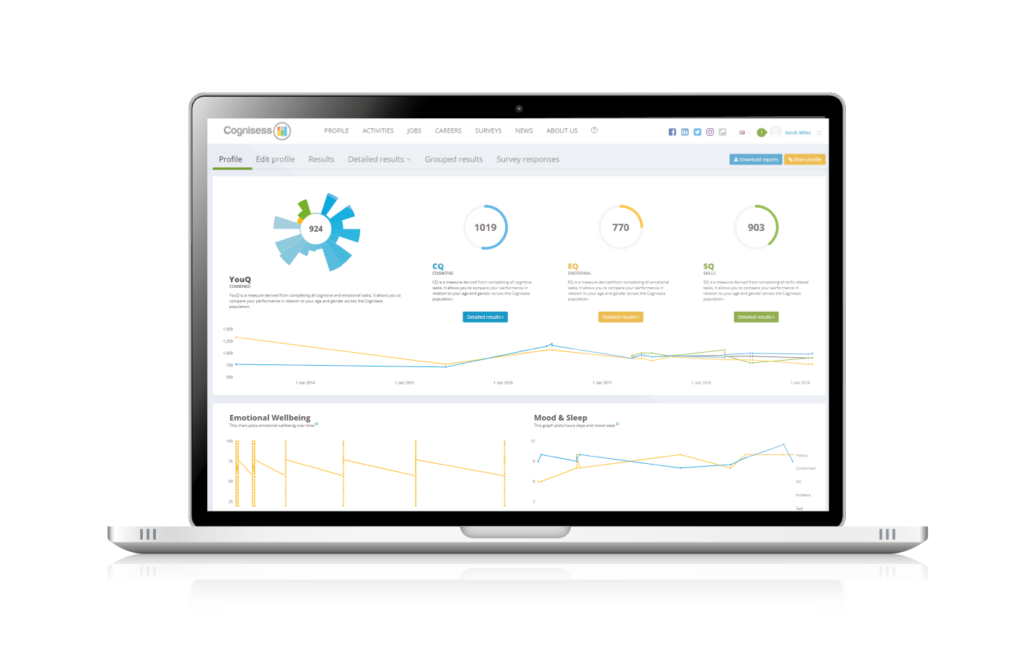Cognisess takes a look at an emerging trend in People Analytics using data and insights gained from analysing some of our client’s high-profile, global graduate recruitment schemes.
It is predicted that 50% of roles today will not exist by 2025. We will need strong leaders to guide employees through today’s rapidly changing workplace. But what will a future leader look like? How can companies identify these leaders and what skills will they need?
Key skills all future leaders will need
Adaptability
The workplace is ever changing. Leaders will need to embrace this change to thrive. It is not only technology that is driving this change. In the future, there will be a shift in leadership style, moving away from an egocentric and hierarchical management style to focus on nurturing employees to be active and valued contributors. Instead of the leader telling their teams what they need, it will become more of an open dialogue between management and employees. This will create an environment were people and development are at the heart of the workplace. As a talent management platform, we are excited about this prospect and look forward to welcoming more organisations onto our People Analytics software.
High Emotional Intelligence
AI can process data more efficiently than humans, but there are still skills we are stronger in. A Korn Ferry study found human talent is 2.33 times more valuable compared to assets like technology. A high emotional intelligence allows future leaders to be aware of their own strengths and weaknesses as well as their teams. This means the manager can troubleshoot ways to improve themselves as well as their team – creating the strongest team possible.

This ability will be supported by AI. For example, although a manager can identify why a team may not be working well together, with Cognisess Team Fit they are able to view data on employees talents and see how dynamic the group is through a series of graphs. This data supports a leaders ‘gut feeling’ with physical results they can present to colleagues.
Comfortable with embracing and leading innovation
In the future, AI and humans will work together to optimise the workplace. A leader will need to understand the new challenges and opportunities this presents – for example data management and skill building. Managers need to be open to not only accepting new technology but also managing the relationship between employees and AI. There will be workers who aren’t as comfortable with the change as others – a high performing future leader will support these people to adapt and become confident with working with technology. This will create a united and technologically minded workforce.
To stay ahead of the curve, leaders will need to keep updated on the new tools and assessments that can enhance their organisation before their competitors. By signing up to our newsletter you will hear about our products, company updates and industry news without having to leave your inbox. Sign up on our blog page.
How diverse will future leaders need to be?
The number of women the workforce is increasing and companies are continuously trying to become more inclusive of gender, race and age. There are also a number of benefits to having a diverse workforce, according to McKinsey racially and ethnically diverse companies outperform industry norms by 35%.

However, only 4% of CEOs worldwide are women according to Deloitte’s Women in the Boardroom: A Global Perspective. But the report also uncovered that businesses who have females in top leadership positions have almost double the number of women on their board. Gender diverse boards are also more likely to hire a female board chair or CEO. It seems that diversity has a multiplying effect, according to this Parliament UK report the female employment rate is at its highest since records began (71%). The current workforce is becoming more diverse than ever. In the future, females in today’s workforce will hopefully move into management positions, increasing diversity within leadership roles.
Equally, we will also need to recruit talent from all different walks of life regardless of gender, age, ethnicity, country of origin or educational background. Diversity of thinking and approach in the workplace is critical to ensure new ideas and solutions are free flowing. The danger of recruiting the same type of candidate from the same background is that you only ever get the same answers and consensus. Outside the box thinking really does come from outside of the box!
How are companies preparing for the future now?
The businesses who are adopting AI and People Analytics now are starting to get ahead of the curve. People Analytics help you to identify the attributes needed now and for the future to help develop a mobile and agile workforce for today and tomorrow.

At Cognisess we have supported a wide range of clients with their graduate programmes, from hotel giants (IHG) to the world’s largest brewer (AB InBev). These graduate programmes are developing the leadership talent of tomorrow. Although there will be universal leader traits for the future regardless of the sector (as discussed earlier on in this article), we also recognise that leaders may look different in every organisation depending on the sector or culture. For instance, a hotel manager needs to be able to work well under time pressure when solving customers queries in a fast paced hospitality environment. Whereas this would be an advantage as an AB InBev leader, but not essential.
What is the process?
Taking AB InBev’s graduate programme as an example, we initially assessed a current cohort of AB InBev’s top talent who are currently on the graduate scheme. Additionally, AB InBev wanted graduates who fitted into their strong company culture. The organisation’s most loyal employees also completed assessments on Cognisess Pro. The data collected included personality traits, emotional intelligence and cognitive abilities. The combined assessment results enabled Cognisess to uncover characteristics that correlate to success in the role and the company. Analysing their current high performers not only helps to understand the qualities that make them so successful – but informs which applicants to recruit to ensure a high performing future workforce.

Our expert team then constructed a detailed job profile based on the collected characteristics. This became the benchmark to assess the graduate recruits on Cognisess Pro. The applicants completed a series of cognitive, emotional and personality based assessments. The process resulted in targeted applicant recommendations, increasing the chance of successful hires for AB InBev. Recruiting these talented graduates who share the same values as the company and possess the qualities to lead will ensure a more efficient organisation, with the right people in those leadership roles.
Adapting to an ever-changing workforce, high emotional intelligence and being comfortable to embrace a new working relationship with AI are some of the universal traits a future leader will need. At Cognisess, we are supporting many leading companies to invest in identifying the attributes they need for future leadership and recruiting the best talent. Book a free demo of Cognisess Pro today to see how the most advanced People Analytics and AI Assessment Platform on the market today can help your organisation find the leaders of tomorrow.


